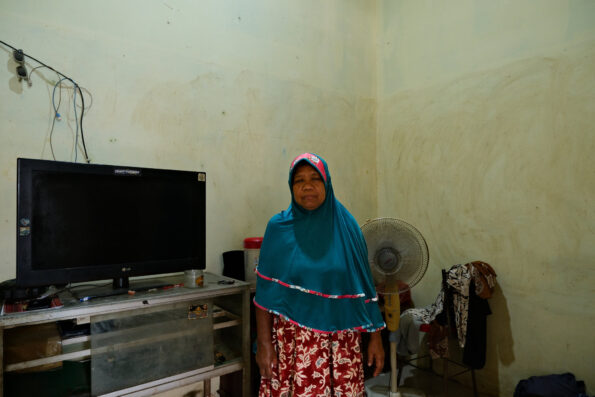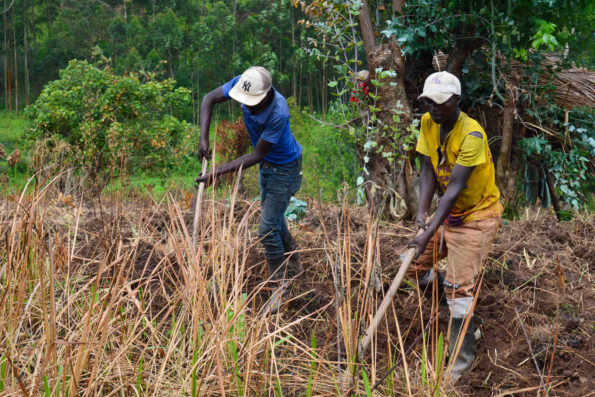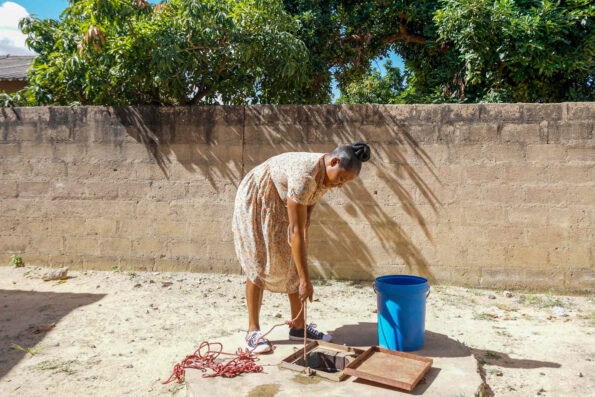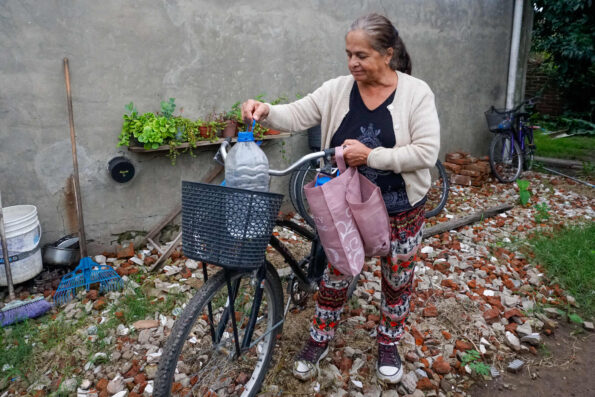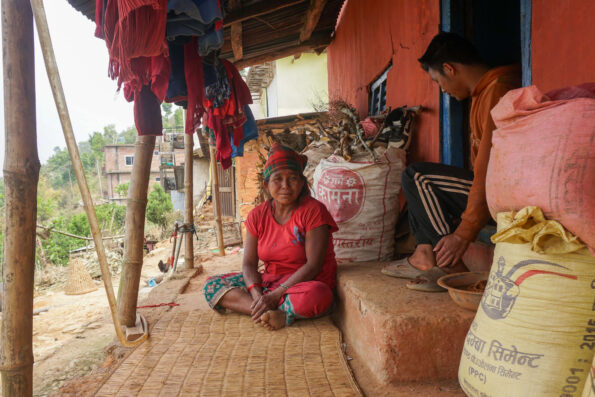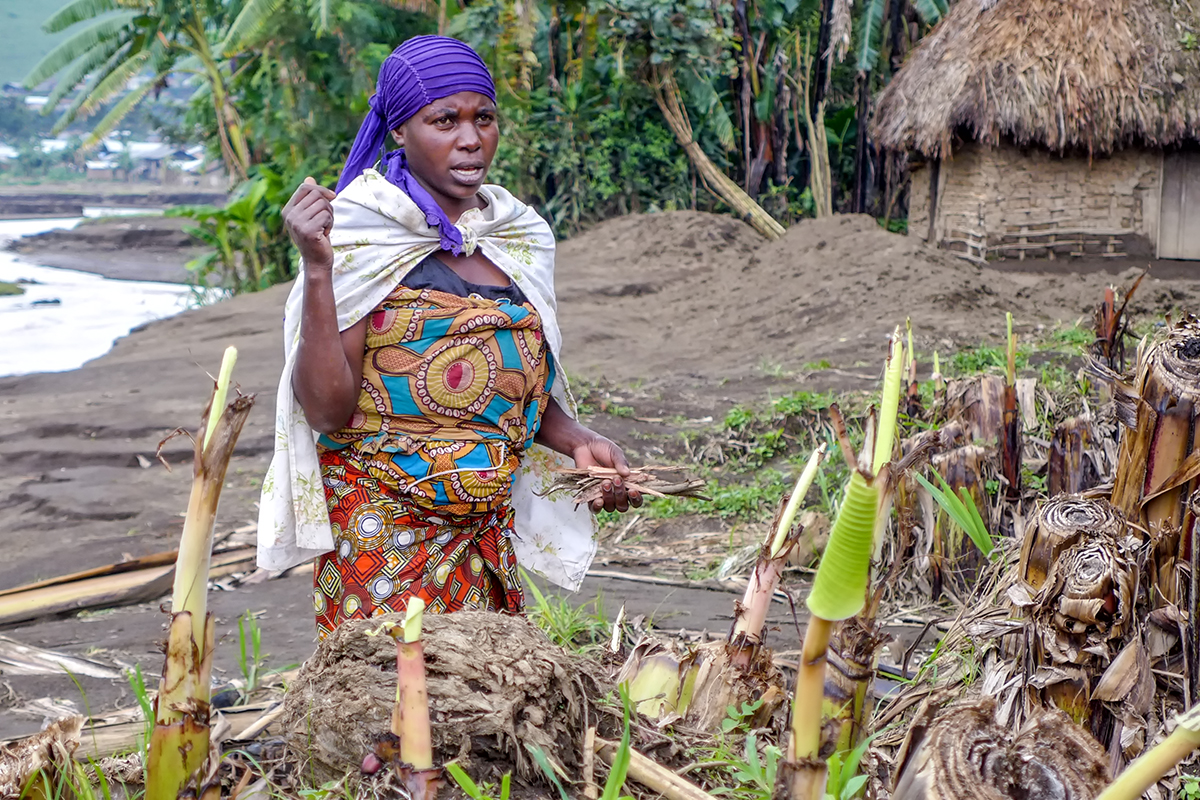
Judith Faida Lukoo, GPJ DRC
Gertrude Fatuma, 36, says her home miraculously escaped the flood. She says she has become terrified by the rain.
BIHAMBWE, DEMOCRATIC REPUBLIC OF CONGO — This little corner of the Masisi territory is known as “little Switzerland” for its lush, green hills and picturesque villages. But the villages are less quaint when the rain pours with fury.
In late 2017, the area just below the bridge over the Mema River was filled with little houses. Today, after months of flooding that began in September, the area looks like a bald head. Only little bits of debris remain on the brown, muddy earth. The rest was stolen by the raging river.
“We don’t know if it’s a curse or what,” says Christian Balibuno, 40, a civil servant who offers tax services locally. “We thought it was a normal rain.”
But by late September, the whole village knew that this season would not be like any other.
“One of our employees who had stayed late was swept away by floods,” he says of one of the floods in late 2017.
The river water became an apocalyptic force, says Honoré Kamungu, 15, who lost his mother during another flood.



“We were waiting for our evening meal. My two brothers, my three sisters and I were in the kitchen. My mother was in her room when flood waters suddenly rose into our kitchen. Quickly, we climbed up to the ceiling of the house and stayed there hanging like bats,” he says.
His mother wasn’t able to climb.
“When the waters carried away our mother, we last heard her voice crying out for help. Not knowing what to do, we cried and moaned while in the ceiling,” Kamungu says.
The 2017-18 rainy season has claimed several lives in the typically quiet village of Bihambwe. Residents blame a lack of infrastructure for the human and material ruin.
February offers a reprieve from the rainy season, which spikes in March and September here.
Bihambwe has just 718 homes. Most families make their living from agriculture or in the mining industry. Sought-after minerals like coltan are plentiful here.
The unique location of the village is contributing to the damage, says Rémy Muhima, 45, an environmentalist and geography teacher at Bihambwe High School.
“This is at the confluence of the Rushoga and Mema rivers,” he says of the village location, which is also surrounded by hills that contribute runoff to the already raging rivers.
Since September 2017, this village has recorded 103 deaths, says Parfait Twisenge, the local police commissioner. In addition, 12 motorcycles and one bus have washed away. All 718 households remain at risk.
“We have experienced floods, but never losses of life comparable to these,” says Innocent Busimba Ndungutse, 51, an elder in the village.



With another rainy season just weeks away, residents who have lost homes and crops are worried, as food shortages are becoming apparent.
“People have lost crops, and fields are devastated to the point that we’re facing difficulties to get food,” said Aimée Mukandirwa, 39, a mother of seven who owns a restaurant in Bihambwe.
Rain clouds have become a source of fear, says resident Gertrude Fatuma, 36.
“Whenever it looks like it’s going to rain, all of us who are along the river move to the other side of the main road. Sometimes in shelters, sometimes we install tarpaulins on the grazing lands here for fear that we could also become victims,” she says.
Local officials are recommending that people move up the hillsides and away from the riverbanks.
“To avoid such disasters in the future, people have to give up the river banks,” says Juvénal Bahuma Mahesh, the village chief.
Houses in the village are poorly constructed, and the area lacks communications infrastructure to assist during emergencies, issues that residents say are exacerbating the problem.
Joël Kambale Ndagana, coordinator at the civil-protection unit for the North Kivu provincial government, says they are looking into relocating citizens at risk from further flooding disasters.
“Because the state exercises permanent sovereignty over the soil, the subsoil, the waters and the forests, it has the right to decide where to place people for their safety,” he says.
Twisenge, the Bihambwe police commissioner, says he is in favor of government-sponsored relocation.
“Only in this way will the government protect people against similar disasters in the future,” he says.
“We’ve already lost many people in Congo with all these unending wars, especially in our province,” he says. “It shouldn’t be necessary that we lose our compatriots to such disasters.”
Ndayaho Sylvestre, GPJ, translated this article from French.


